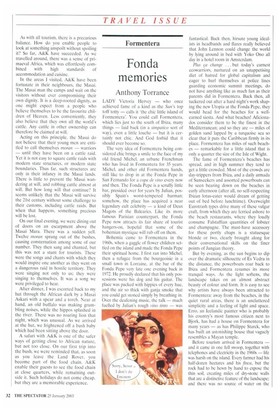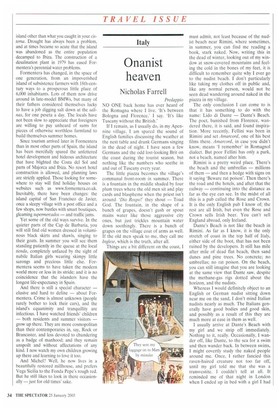Fonda memories
Anthony Torrance
As with all tourism, there is a precarious balance. How do you enable people to look at something unspoilt without spoiling it? So far, A&K have succeeded. As we travelled around, there was a sense of primaeval Africa, which was effortlessly combined with high standards of accommodation and cuisine.
In the areas I visited, A&K have been fortunate in their neighbours, the Masai. The Masai man the camps and wait on the visitors without ever compromising their own dignity. It is a deep-rooted dignity, as one might expect from a people who believe themselves to be the favourite children of Heaven. Less conveniently, they also believe that they own all the world's cattle. Any cattle in other ownership can therefore be claimed at will.
Acting on this principle. the Masai do not believe that their young men are entitled to call themselves moral! — warriors — until they have been on a cattle raid. Yet it is not easy to square cattle raids with modern state structures, or modern state boundaries. Thus far, such structures are only in their infancy in the Masai lands. There is little to prevent the Masai wandering at will, and robbing cattle almost at will. But how long will that continue? It seems unlikely that the Masai will survive the 21st century without some challenge to their customs, including cattle raids. But when that happens, something precious will be lost.
On our final evening, we were dining out of doors on an escarpment above the Masai Mara. There was a sudden yell. Twelve moran sprang out of the bushes, causing consternation among some of our number. They then sang and chanted, but this was not a stunt for tourists. These were the songs and chants with which they would inspire one another as they went on a dangerous raid in hostile territory. They were singing not only to us; they were singing to themselves. It was a song we were privileged to hear.
After dinner, I was escorted back to my hut through the African dark by a Masai Askari with a spear and a torch. Near at hand, an old buffalo was making grumbling noises, while the hippos splashed in the river. There was no roaring lion that night, which was unusual. As we arrived at the hut, we frightened off a bush baby which had been sitting above the door.
A safari with A&K is one of the safer ways of getting close to African nature, but not too close. On our first trip into the bush, we were reminded that, as soon as you leave the Land Rover, you become part of the food chain. A&K enable their guests to see the food chain at close quarters, while remaining outside it. Such holidays do not come cheap, but they are a memorable experience.
LADY Victoria Hervey — who once achieved fame of a kind as the Sun's top toff totty — calls it 'the chic little island of Formentera'. You could call Formentera, which lies just to the south of Ibiza, many things — laid back (in a simpatico sort of way), even a little louche — but it is certainly not chic. And God forbid that it should ever become so.
The very idea of Formentera being considered chic brings a smile to the face of my old friend Michel, an urbane Frenchman who has lived in Formentera for 35 years. Michel, and other old Formentera hands, still like to drop in at the Fonda Pepe in San Fernando for a copa de vino every now and then. The Fonda Pepe is a scruffy little bar, presided over for years by Julian, possibly Spain's worst-tempered barman; somehow, the place has acquired a near legendary cult celebrity — a kind of Deux Magots of the Balearics. Like its more famous Parisian counterpart, the Fonda Pepe now attracts its fair share of tourist hangers-on, hopeful that some of the bohemian mystique will rub off on them.
Bohemia came to Formentera in the 1960s, when a gaggle of flower children settled on the island and made the Fonda Pepe their spiritual home. I first ran into Michel, then a refugee from the bourgeoisie in a small town in Lorraine, at the bar of the Fonda Pepe very late one evening back in 1972. He proudly declared that his only possessions were his dog and his guitar. The place was packed with hippies of every hue, and the air so thick with ganja smoke that you could get stoned simply by breathing in. Over the deafening music, the talk — much fuelled by Julian's rough vino unto — was
fantastical. Back then, hirsute young idealists in headbands and flares really believed that John Lennon could change the world by lying around in bed with Yoko Ono all day in a hotel room in Amsterdam.
Plus pa change ...but today's earnest ecowarriors, nurtured on an unappetising diet of hatred for global capitalism and eager to hurl themselves at police lines guarding economic summit meetings, do not have anything like as much fun as their parents did in Formentera. Back then, all tuckered out after a hard night's work shaping the new Utopia at the Fonda Pepe, they would head for the beaches for a wellearned siesta. And what beaches! Aficionados consider them to be the finest in the Mediterranean; and so they are — miles of golden sand lapped by a turquoise sea so clear that it puts the Caribbean firmly in its place. Formentera has miles of such beaches — remarkable for a little island that is only a quarter the size of the Isle of Wight.
The fame of Formentera's beaches has spread. and in high summer they tend to get a little crowded. Most of the crowds are day-trippers from Ibiza, and a daily armada of Sunseekers and assorted powerboats can be seen bearing down on the beaches in early afternoon (after all, no self-respecting Ibizan lotus-eater would dream of getting out of bed before lunchtime). Overweight Eurotrash types drive many of these vulgar craft, from which they are ferried ashore to the beach restaurants, where they loudly consume Falstaffian quantities of lobster and champagne. The must-have accessory for these portly chaps is a statuesque blonde or two, clearly brought along for their conversational skills on the finer points of Jungian theory.
But by evening, as the sun begins to dip over the dramatic silhouette of Es Vedra in the distance, the powerboats roar back to Ibiza and Formentera resumes its more tranquil ways. As the light softens, the landscape takes on an almost abstract beauty of colour and form. It is easy to see why artists have always been attracted to Formentera: away from the beaches, in the quiet rural areas, there is an uncluttered simplicity and a feeling of light and space. Erro, an Icelandic painter who is probably his country's most famous citizen next to Bjork, has had a house on Formentera for many years — as has Philippe Starck, who has built an astonishing house that vaguely resembles a Mayan temple.
Before tourism arrived in Formentera — and it came in one fell swoop, together with telephones and electricity in the 1960s — life was harsh on the island. Every farmer had his half-dozen hectares and his finca, but the rock had to be hewn by hand to expose the thin soil, creating miles of dry-stone walls that are a distinctive feature of the landscape; and there was no source of water on the island other than what you caught in your ctsterna. Drought has always been a problem, and at times became so acute that the island was abandoned as the entire population decamped to Ibiza. The construction of a desalination plant in 1979 has eased Formentera's perennial water problems.
Formentera has changed, in the space of one generation, from an impoverished island of subsistence farmers with 18th-century ways to a prosperous little place of 6,000 inhabitants. Lots of them now drive around in late-model BMWs, but many of their fathers considered themselves lucky to have a job digging salt down at the salinas, for one peseta a day. The locals have not been slow to appreciate that foreigners are willing to pay unheard of sums for pieces of otherwise worthless farmland to build themselves summer homes.
Since tourism arrived later in Formentera than in most other parts of Spain, the island has been mercifully spared the unfettered hotel development and hideous architecture that have blighted the Costa del Sol and parts of Majorca and Ibiza. No resort hotel construction is allowed, and planning laws are strictly applied. Those looking for somewhere to stay will find holiday houses on websites such as www.formentera.co.uk. Inevitably, there have been changes: the island capital of San Francisco de Javier, once a sleepy village with a post office and a few shops, now bustles with smart boutiques, gleaming supermercados — and traffic jams.
Yet some of the old ways survive. In the quieter parts of the Cap de Barbaria, you will still find old women dressed in voluminous black skirts and shawls, singing to their goats. In summer you will see them standing patiently in the queue at the local tienda, completely unfazed by the sight of nubile Italian girls wearing skimpy little sarongs and precious little else. Formentera seems to have taken the modern world more or less in its stride; and it is no coincidence that the islanders have the longest life-expectancy in Spain.
And there is still a special character — elusive and hard to define — about Formentera. Crime is almost unknown (people rarely bother to lock their cars), and the island's equanimity and tranquillity are infectious. I have watched friends' children — both residents and summer visitors — grow up there, They are more cosmopolitan than their contemporaries in, say, Rock or Brancaster, and less devoted to chundering as a badge of manhood; and they remain unspoilt and without affectations of any kind. I now watch my own children growing up there and learning to love it too.
And Michel? Well, he now lives in a beautifully restored millhouse, and prefers Vega Sicilia to the Fonda Pepe's rough red. But he still likes to look in there occasionally — just for old times' sake.



















































































 Previous page
Previous page